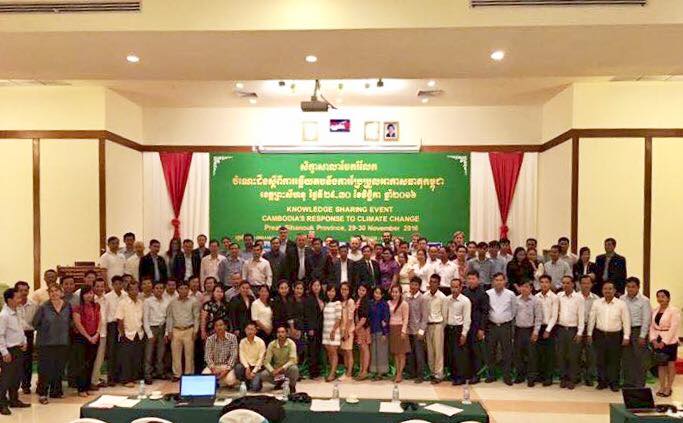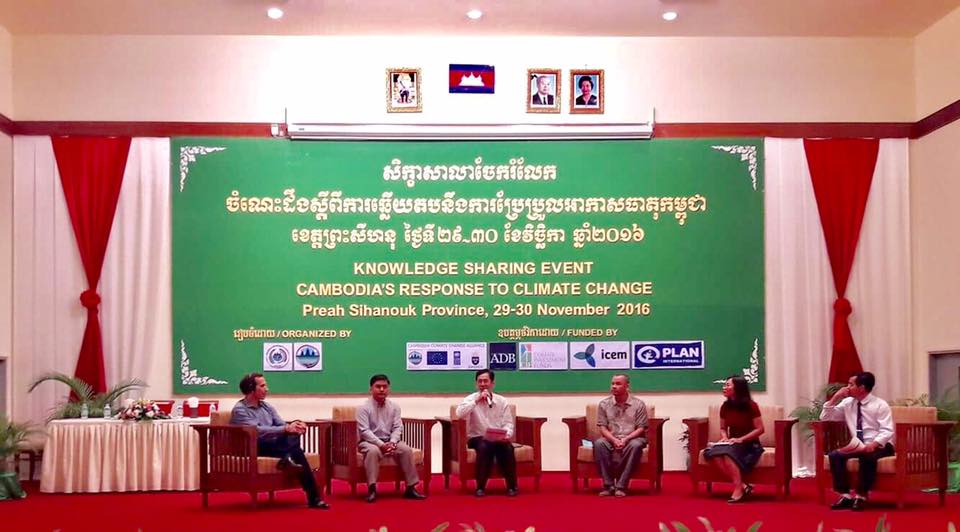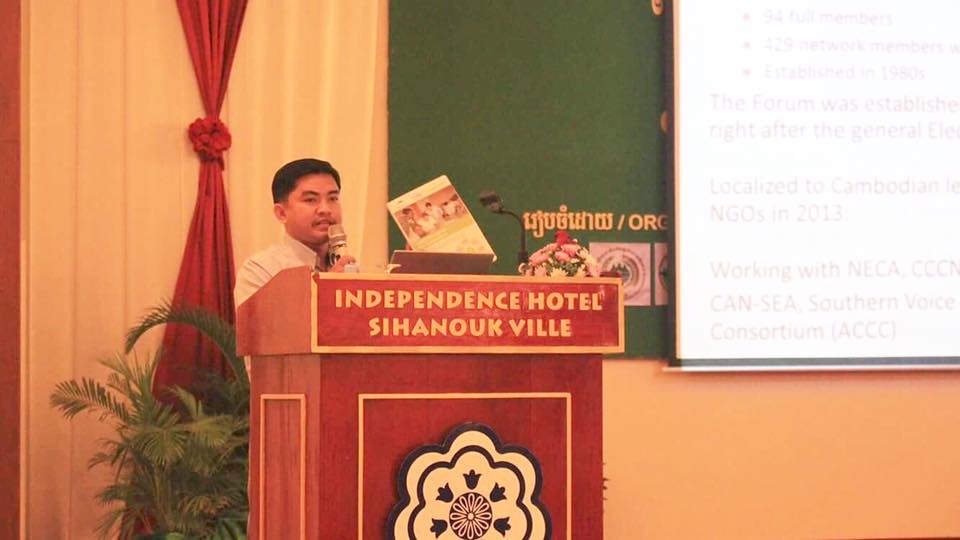
On 04 December 2016: Civil society initiative for promoting effective and equitable adaptation, Southern Voices has developed Joint Principles of Adaptation (JPA) which promotes multi-stakeholder participation in the shaping of policies on climate change adaptation. Totally 120 climate change practitioners and representatives, including 15 sectors of Climate Change Action Plan (CCAPs) to CCCSP; the government representatives, development partners, academia, NGOs, community-based organizations involved in the implementation of climate change related projects, as well as the private sectors had been learnt on JPA principles. The Joint Principle for Adaptation in Cambodia context had been shared into Knowledge Sharing Event on Cambodia’s Response to Climate Change. The event also bring together 15 authors of the most relevant adaptation cases submitted in response to the call for documented community based climate change related practices in Cambodia.
This is a very innovative exercise, introducing many new tools and approaches for mainstreaming of Climate Change in our regular practices. JPA is going to be a benchmark to ensure effective and equity climate change application especially CCAPs operation. It will be a learning process for us, but it is also a process that many international partners are interested in.
The Project Coordinator for NGOF and partners of SV-Adapt, Mr. Sey Peou commenced the proceedings of the workshop with an introductory sharing which underlined on roles and how the CSOs using the JPA principles. He also highlighted the need for a transparent and inclusive means of implementing the CCAPs, NAP process, as well as the need for a transparent and accountable adaptation finance mechanism. He commented on the need to secure the grassroots through capacity building and to focus on a more inclusive representation of vulnerable groups by taking into account the capacity of women and the differently-abled people in disaster situations.
So far; we Cambodia CSO as well as NGOF have introduced and applied the JPA principles to both his CSO members and related ministries for instance, we had used the JPA principle onto ten years strategic paper CCCSP developing, two multi-stakeholder consultation workshops on NAP; three consultation workshop on INDCs etc.
The Royal Government of Cambodia (RGC) is committed to pursuing national sustainable development that ensures a better quality of life and improves the living standards of its people.
One of the main national development priorities is to reduce poverty. Thus, efforts in addressing climate change cannot be separated from economic development and poverty alleviation of the people. Addressing economic and social development by taking into consideration climate change will assist the RGC in reducing vulnerability to potential climate risks, improving air quality and participating with the international community to mitigate GHG emission—the root cause of climate change. Climate change has a critical implication for the people, especially Cambodia rural households who depend strongly on natural resources that are projected to be highly impacted by climate change. Households engaged in agricultural activities currently have the highest incidence of poverty and as such they are also highly vulnerable to climate change.

In 2013, the RGC launched the Cambodia Climate Change Strategic Plan 2014-2023 (CCCSP), providing an overall framework for climate change response and the integration of climate change issues into development planning at national and sectoral levels. Cambodia Climate Change Strategic Plan is the first comprehensive strategic plan for Cambodia. As a result, the Strategic National Development Plan 2014-2018 (NSDP) has set climate change as a cross-cutting issue, making climate change mainstreaming an integral part of development and poverty reduction efforts in Cambodia. Following guidance from CCCSP, technical line ministries have developed climate change action plans to operationalize the CCCSP for their sectors, thus contributing to a coordinated effort to address climate change issues in Cambodia.
The CCCSP was developed following the guidelines of the Council of Ministers. The CCCSP outlines the vision, mission, goals and objectives, as well as the strategic framework analysis in defining the strategic objectives and strategies. Climate Change Action Plans will be prepared as separate documents, which detail the identification and prioritization of the actions for achieving the strategic objectives of the CCCSP.
Alongside the CCCSP, fifteen ministries have developed their Sectoral Climate Change Strategic Plans (SCCSP) to guide the integration of climate change into their sectoral planning. While the CCCSP provides a national perspective and framework for addressing climate change, the SCCSPs of the line ministries focus on sector-specific responses to climate change.
Fifteen ministries have now developed their Sectoral Climate Change Action Plans (SCCAP) to operationalize their SCCSPs. CCAPs is a crucial step in the CCCSP process, and will provide concrete information on the needs and plans of various sectors for the implementation of the Climate Change response;
Good coordination of the national and sub-national responses is very important to effectively address climate change. To that end, a guideline for mainstreaming climate change into sub-national planning is being prepared under the auspices of the Secretariat of the National Committee for Sub-national Democratic Development (NCDD).
Presenting on the Climate Change Response, H.E. Dr. Tin Ponlok, GSSD’s Secretary General, underlined; Mr. Sum Thy, Director of Climate Change Department provided an insight into the CCCSP and NAP process in terms of its purpose, structure and scope which carried out a series of expert consultation sessions with various stakeholders. This included the recognition of the critical areas of focus based on the vulnerabilities identified within the system, as well as the formulation of tentative budget plans. He further elaborated that Cambodia, having covered reasonable groundwork in terms of establishing national climate change policies and the NAP, is still in the preparatory stage and that the implementation arrangements focusing on institutional and coordination mechanisms needs to be the focus henceforth. Additionally he underlined that designing and implementing an effective climate change response is considered a difficult task because the exact timing, place and impacts of climate change are not yet identified with a reliable level of certainty. Knowledge-sharing is thus very important to improve the efficiency and effectiveness of the climate change response. The private sector was identified as a crucial medium of extending the education and awareness on climate change and mitigation as well as adaptation procedures to ground level individuals such as farmers and fisher folk.
Meanwhile; several individuals speaking on the involvement of the private sector, media and academic as a stakeholder in climate change actions pointed to the lack of awareness as a key issue. Accordingly, budgetary allocations for raising awareness, circulation of advertisements were suggested as immediate steps, as well as media engagement.
Please notice that it is a 2nd knowledge sharing workshop in 2016 within key sessions on
1) Government’s efforts in addressing climate change, including Cambodia’s climate change response, its national strategy and plans for addressing climate change,
2) Experiences, lessons learnt and potential synergies for local level adaptation from the implementation of different projects, including those focusing on agriculture, livelihoods and local governance,
3) Status of climate change mitigation efforts in Cambodia and lessons learnt from the development and implementation of mitigation projects, including different results based climate finance mechanisms (CDM, NAMA, REDD+), and
4) community-based adaptation, including traditional and indigenous adaptation practices (e.g. in water resources, infrastructure, and agriculture) and adaptation practices which empower women and children/youth. A market place exhibiting selected adaptation case studies also provided an opportunity for participants to discuss their respective approaches and learn from each other in a more informal manner.
